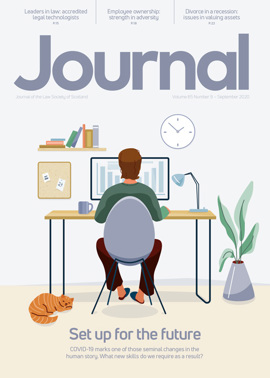Profile: Stuart Munro
What made you pursue a career as a solicitor?
It wasn’t really planned. I was expected to do well in my Highers, and my guidance teacher told me – in a five minute meeting – it was either medicine or law. I chose law. Glasgow and Edinburgh rejected me because of my age, as I was still 16, but I was lucky enough to be accepted by Strathclyde. The good luck continued at the end of my second year, when a friend’s dad, who was a sergeant in the courts branch, said he could get me a summer job at a criminal defence firm. What was meant to be a six week placement has lasted 29 years and counting.
What motivated you to become involved in the work of the Society?
I've always had an interest in technology, and a frustration with processes that seem to be unnecessarily cumbersome. That led me to the work of the Technology Committee, then led by Paul Motion. The committee tried its best to advocate for sensible change in the justice system, like being able to communicate by email and lodge documents in pdf form, but it took a pandemic for much of that to become routine.
Can you tell us about some of the key challenges in your work as a committee member through the outbreak?
The courts went into almost complete shutdown once lockdown was announced. It was almost immediately apparent that wasn’t sustainable – a country needs a functioning justice system, and solicitors needed to be able to do their work. We quickly initiated various working parties, securing participation from the Scottish Courts & Tribunals Service and the Crown Office & Procurator Fiscal Service, along with the Faculty of Advocates. Regular meetings took place using Microsoft Teams. A strong sense of cooperation and goodwill developed, and I think that helped speed up the process of reopening.
A key highlight was acting as the Society representative on the Lord Justice Clerk’s working group on resuming solemn trials, which developed the innovative remote jury model. With the strong support of the Society and Faculty, remote jury centres will soon open in Glasgow and Edinburgh, allowing Scotland – in sharp contrast to England & Wales – to get back to and beyond the pre-pandemic number of serious criminal trials.
What do you see as the key issues for the future of the Scottish legal profession?
There are huge challenges ahead. From a litigation perspective, the courts have been left with enormous backlogs and lower capacity. The economic impact of the pandemic will no doubt have an impact on investment and funding. But as we saw during the pandemic, society needs a properly functioning justice system, and that requires a strong, sustainable profession.
In the years to come, we can expect ever greater demands for legal services from those with a pressing need to protect their rights and interests. The courts, and the other agencies with whom we interact, will become ever more dependent on technology; lawyers will need to shape and embrace these developments.
What’s your top tip for new lawyers?
I’ll suggest two. First, work hard at becoming part of the team. Muck in. Try to support your colleagues. Make yourself invaluable because of your efforts. Secondly, think about what you can offer that’s different. Maybe you’re more familiar with new technology and can guide your colleagues through new procedures. Maybe you’re a good organiser; or have good people skills; or speak a different language. Try to use that skill for the benefit of everyone.
If you could change only one thing for your members what would it be?
To make the profession more representative of society as a whole. Not just in terms of race, gender and sexuality – though these are enormously important – but also in terms of what your parents did for a living, where you went to school, whether you have a disability, your religious faith, and so on. The profession needs good people with brains – other factors should neither help nor hinder.
What keeps you busy outside of work?
The job eats time – most working days are at least 10 hours long. After walking the dogs and ferrying the teenagers, there isn’t much “outside” left. But on the odd occasion when there is time to spare, a long run, meal with the family and good bottle of red wine does the trick.
Regulars
Perspectives
Features
Briefings
- Civil court briefing: Lessons from a video proof
- Corporate briefing: Business support: going our own way
- IP briefing: China – a friendlier place for IP rights?
- Agriculture briefing: Was there a croft here?
- Scottish Solicitors' Discipline Tribunal
- Planning obligations: seeking better practice
- Construction briefing: Rough justice, smoother delivery






